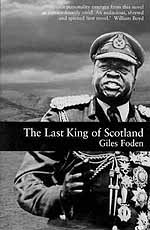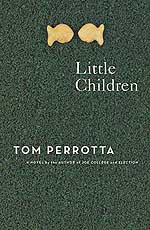
Giles Foden’s “The Last King of Scotland” is a deeply resonant reading experience to say the least. The book is written from the perspective – in journal form more often than not – of Nicholas Garrigan, a Scottish physician who comes to the African country of Uganda for both self-fulfillment and to be of medical service where he can. However, what he discovers in the equatorial chaos of Idi Amin’s dictatorship is a sickening twist of friendship, camaraderie and, ultimately, self-loathing.
An idealist in many ways, Garrigan is nothing if not a familiar and typical characterization, someone we can both empathize with and, in many ways, he is someone we can lose ourselves in for the purposes of witnessing the world before him. Garrigan isn’t a far cry from the everyman, and that aspect of his persona is one that will afford the greatest impact when we are confronted with the atrocities yet to come.
Garrigan is summoned one sultry afternoon to the services of Amin when the military leader’s Maseradi collides with a cow, leaving Amin in disarray, and the cow dearly departed. It is an extreme and somewhat violent introduction to the man in much the same way a giant boulder crashing into a swimming pool at the beginning of Jonathan Glazer’s “Sexy Beast” signifies the coming of an equally largess personality in Ben Kingsley’s Don Logan. Though we are treated to an interesting introductory chapter detailing a dinner event that occurs further in the future, an event fit with Amin’s various idiosyncrasies, it is the automobile accident that reveals all sides of the man at once – tenderness, rage, frailty and insanity. Later taken under wing by Amin as a personal physician, Garrigan becomes immersed in a world of diabolical political turmoil, a journey almost Kurtz-like in nature to the heart of Ugandan darkness.
Foden’s award-winning novel is exacting in that the author takes time to describe the most mundane of details, serving, much like writer Stephen King, to offer a complete and thorough reading experience. Garrigan’s voice comes across singularly – meandering and lost in a world that comes crashing down around him soon enough. Side excursions and beside-the-point narrative tangents color in a world removed at first glance, but microcosmic in the final analysis.
Amin is indeed a vicious tyrant, but Garrigan is forced to see him in much more manageable terms. To the good doctor, the dictator is a giant baby, one who needs attention, assurance and, at times, burping...literally. But the satanic sparkle in the dictator’s eye holds the promise of crushing validation, what with rumors of cannibalism, genocide and rampant political treachery rampant. Yet Garrigan cannot, for much of the novel, wrap his mind around such notions. His complicity in the inhumane nature of this world becomes lost on him, and he goes about life as normal. He falls in love, he makes mistakes and he proves himself human, exhibiting plenty of his own frailty along the way. All the while, Amin and his essence cast a perpetual shadow of threat that only begins to affect Garrigan when things seem to be too far-gone.
“The Last King of Scotland” is a highly literary book, by which I mean it lives and breathes as words to be read, celebratory of the essence of authorship. From Foden’s detailed descriptions to Garrigan’s simulated journal entries, the tale exudes the necessity of being related on the page. Yet a cinematic adaptation also seems begging on the periphery, and documentary filmmaker Kevin MacDonald will be undertaking just such a cause with James McAvoy and Forest Whitaker in the respective roles of Garrigan and Amin.
Taking roles that would need to be extremely embellished off the page to be of any consequence are Gillian Anderson and Kerry Washington, the latter looking to have been thoroughly developed beyond Foden’s conception, given what we’ve seen in the trailer for the film. But regardless of the peripheral cast, “The Last King of Scotland” is most intrinsically about the symbiotic relationship of two men in much the same way as Antoine Fuqua’s “Training Day,” for lack of a better reference. But then “Training Day” doesn’t seem too far out of bounds, as that film plays as a sort of urban-set tale of a much similar nature. Take such inklings for what they’re worth concerning Oscar potential for MacDonald’s film.
“The Last King of Scotland” could make for an exceptional cinematic experience, as the nature of the story is both immediate and cautionary all the same. It might play as an interesting bedfellow to Terry George’s “Hotel Rwanda” for obvious reasons, but it will also likely prove to be a much different experience given the concentration on a singular persona. As such, the filmmakers adapting Foden’s novel have a unique opportunity to speak through specifics to larger truths, rather than rely on cause and mission to more easily relay their sentiments.
MacDonald has said of his films “I’m not interested in making a political statement as much as I am interested in the individuals and their inter-relationships with the politics, how the politics affect them.” It is a valid take considering the source material this time around, and his work this year will surely combine with Philip Noyce’s upcoming “Catch a Fire” to bring the lessons learned in Africa to the forefront, to be scrutinized in relation to current foreign policy or not. But such decisions are always left to the viewer, are they not?


